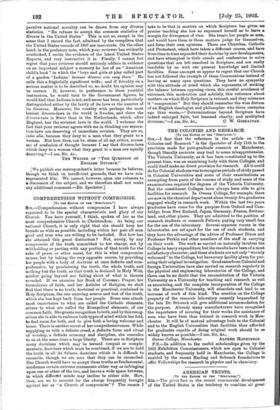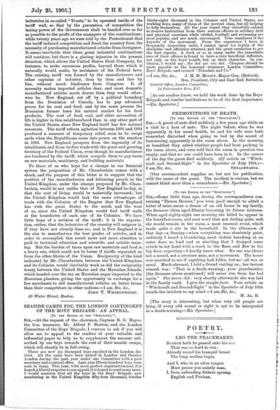AMERICAN TRUSTS.
[TO THE EDITOR OF THE " SPECTATOR."] SIR,—The great fact in the recent commercial development of the United States is the tendency to combine all great
industries in so-called " Trusts," to be operated inside of the tariff wall, so that by the prevention of competition the taxing power of the Government shall be handed over as far as possible to the profit of the managers of the combinations ; while twenty years ago we were told by the Protectionist that the tariff induced competition and freed the country from the - necessity of purchasing manufactured articles from foreigners. It seems inevitable that these great industrial combinations will continue, but there is a glaring injustice in the present situation, which allows the United States Steel Company, for instance, to make enormous profits, beyond those which it naturally would make, by assistance of the Federal laws. The existing tariff was framed by the manufacturers and other captains of industry, , item by item and line by line, without much hindrance from Congress. It of necessity makes imported articles dear, and most domestic manufactured articles much dearer than they would other- wise be.. New England, cut off by a political boundary from . the • Dominion of Canada, has to pay advanced prices for its coal and food, and by the same process the Dominion farmer loses his natural market for his food products. The cost of food, coal, and other necessities of life is higher in this neighbourhood than in any other part of the United States, since New England itself has few natural resources. The tariff reform agitation between 1886 and 1894 produced a measure of temporary relief, soon to be swept aside when the Republicans came into power on the reaction in 1896. New England prospers from the ingenuity of its inhabitants and from its free trade with the great and growing territory of the Federal Union, even though its manufacturers are burdened by the tariff, which compels them to pay taxes on raw materials, machinery, and building materials.
To those of us who hope for a change in our financial system the proposition of Mr. Chamberlain comes with a shock, and the purpose of this letter is to suggest that the position of the manufacturers and labouring people in the United Kingdom, under the change proposed by Mr. Cham- berlain, would be not unlike that of New England to-day, in that the cost of living would be materially increased ; but the United Kingdom would lack the same advantages of trade with the Colonies of the Empire that New England has with the great States to the south and the west of us, since the United Kingdom would find tariff walls at the boundaries .of each one of its Colonies. We have little hope of a revision of the tariff ; it is the expecta- tion, rather, that the industries of the country will outgrow it, if :they have not already done so; and in New England it is the aim to manufacture the best grades of articles, and in order to accomplish this result more and more attention is paid to technical education and scientific and artistic train- ing. But the burden of taxes upon raw materials and food is a heavy one, which could not be borne if tariffs separated us from the other States of the Union. Reciprocity of the kind indicated by Mr. Chamberlain between the United Kingdom and its Colonies would inevitably work as did the reciprocity treaty between the United States and the Hawaiian Islands, which handed over the tax on Hawaiian sugar imported to the Hawaiian planters, giving the opportunity in exchange for a few merchants to sell manufactured articles on better terms than their competitors in other nations.—I am, Sir, &c.,







































 Previous page
Previous page